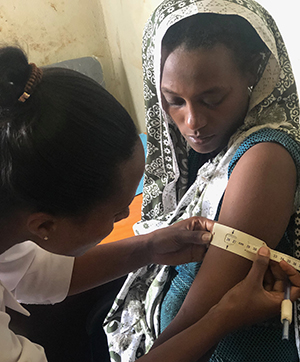Enhancing Nutrition and Antenatal infection Treatment (ENAT) Study

Maternal undernutrition and infections during pregnancy are major causes of poor birth outcomes, including low birthweight (under 2,500 grams) and preterm birth (before 37 weeks gestation). In Ethiopia, one in three pregnant women is malnourished, and reproductive tract infections are common, yet access to screening and treatment remains limited. Each year, an estimated 635,000 babies are born underweight, and 320,000 are born premature. The Enhancing Nutrition and Antenatal infection Treatment (ENAT) Study (“Mother” in Amharic) was a large, pragmatic clinical effectiveness study conducted in the West Gojjam and South Gondar zones of Ethiopia’s Amhara region. It was implemented in partnership with the Addis Continental Institute of Public Health and the Amhara Public Health Institute. From 2020 to 2022, we enrolled 2,400 pregnant women across 12 rural health centers. Antenatal care was strengthened in all participating health centers.
Participants were randomly assigned to receive one of four antenatal care approaches:
Routine antenatal care
Enhanced nutrition: a monthly supply of iodized salt and fortified balanced energy-protein (BEP) supplements for undernourished mothers
Enhanced infection management: screening and treatment for genitourinary infections, plus intensive deworming
Combined nutrition and infection interventions
The study evaluated how these interventions impacted birth weight, length at birth, preterm birth, and other maternal and newborn outcomes. Findings were published in BMJ Global Health in June 2025.
Longitudinal Infant Development & Growth (LIDG) Study
To understand the long-term effects of the antenatal interventions, the Longitudinal Infant Development and Growth (LIDG) Study (“child” in Amharic)—followed 463 children born to ENAT participants until 12, 18, and 24 months of age. LIDG aims to understand how interventions during pregnancy affect offspring child growth and early brain development. The study began with community-led formative research prior to the introduction of advanced neuroimaging technologies, including magnetic resonance imaging and electroencephalography. Additional details can be found in the LIDG protocol paper published in BMJ Paediatrics Open in December 2024.
Together, the ENAT and LIDG studies will provide important evidence on the role of prenatal nutrition and infection control on the immediate and long-term health of mothers and children in Ethiopia.